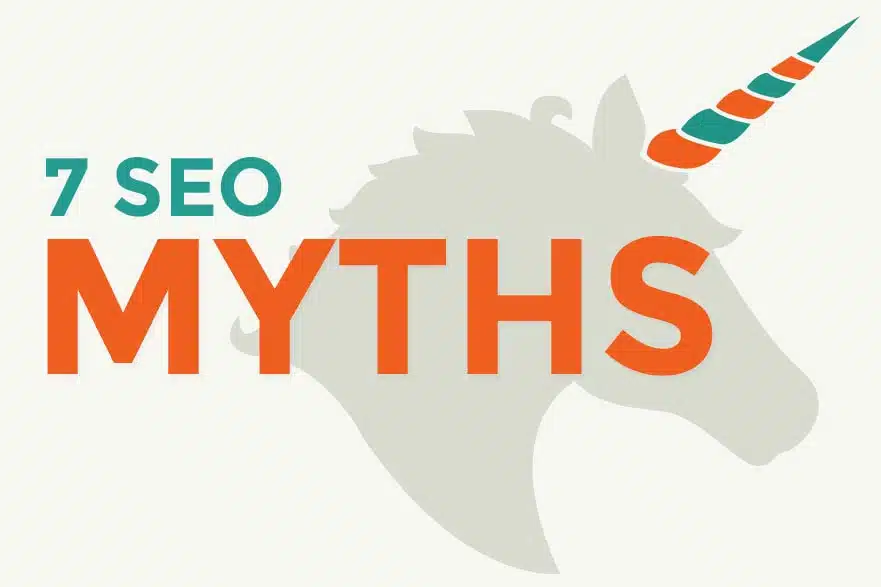

(Updated Mar 2019)
Search Engine Optimization is the secret sauce of the online marketing world – it’s the motherlode, every web marketer’s touchstone, requiring years of study and access to the great arcana of Google’s algorithms.
Except it’s not. That’s a lie. SEO’s not a myth, but there are a large number of myths surrounding it – let’s look at some of the biggest fowls and fads, and see what works.
1.) All I need to do to rank is get my target keyword in the page as often as possible!
Wrong. If we write a phrase like “SEO consultants create search engine optimization solutions for companies needing SEO solutions” – yeah, that includes a lot of keywords… But it’s also really awkward to read.
Most modern search engines are fairly good at telling the difference between text written for the reader – and meaningless word salad intended only to stuff keywords and keyword-related phrases into a document. While it’s true you can only rank for topics your website and its pages are related to – overfilling a document with keywords is a bad idea.
Solution: Be aware of the topics you need to cover on your website, and use terms clearly related to those topics, but above all else – write for humans first. This is the cornerstone of any strongcontent marketing strategy.
2.) I’ve already done SEO on my website – when it was built.
Well… Ok, yeah – good! It’s good to start somewhere, but it’s the stopping that’s causing problems these days.
In 2013, Google changed their ranking algorithm at least 17 times, in big ways.. In 2014, 15 major changes were recorded. So far in 2015, there have been 3 notable updates so far. And that’s just the major changes – smaller tweaks may be going on constantly behind the scenes, without a big enough impact on notable websites to be seen clearly.
And that’s just the search engines. Your competitors, whoever they may be, might well change their websites to better suit visitors’ needs, may be generating social interest or other traffic, and more, that will leave you in the dust if you don’t keep up with their pace.
Solution: Search engine rankings are a moving target, and deserve attention on a regular basis. It’s important to design your website with the existing state of the field in mind – but it’s also important to make sure your website’s ranking environment matches visitor demands and competition as well.
3.) Meta Data is the Most Important Data
Stop. What is this, 1997? Many elements of a website’s meta data are not prominently featured in search results, and they’ve not been the focus of search engine ranking algorithms for a long time. Some of them, such as keywords, aren’t even in common use any more.
Take a look at one of ours;
This is what appears when our website shows up for a search of “Winnipeg website design” right now. Notice that the meta data we’ve entered for our home page is prominently displayed, and that the exact phrase we searched for is emphasized in bold within the text.
There was a time when adding meta data in the form of keywords, descriptions, and a title was the biggest consideration in SEO – but that’s been over for a long time. This is not to say your meta data isn’t still important – but the major reason is to give your visitors a sense of what they’ll find on the pages they’re accessing.
Solution: Stop thinking of your meta data as a direct ranking factor. Rather, think of it as the ad you’re posting for the page you want people to find – it’s there to give them a real, accurate sense of what kind of value they’ll get from viewing your web page.
4.) Why bother with SEO when I can just advertise?
How much time do you spend watching commercials? Thought so.
Just like the 30 second spot, your ads online only reach the kinds of people who are willing to see them. People develop blind spots around things they don’t appreciate – and advertising is one of those things, for many of us. Either we just stop looking at the clearly marked ad boxes, start looking for “sponsored” in social messages, or just install an ad blocker in our browsers to get rid of it all. How valuable is your ad then?
Solution: Online advertising can be an important part of a well-developed digital marketing strategy, but it’s just that – part of your strategy, not the whole thing.
5.) Very little of my traffic comes from search – lots of it comes from Facebook. Why should I still care about SEO when clearly social is the way to go?
It’s easy to think of search as being grouped into “Google, Bing, and Yahoo!” – and look at our Analytics software of choice for those groups alone when considering search engine optimization. But that’s not really the case.
Facebook, for example, has been powered by Bing for some time. Their internal Graph search uses information from Bing’s systems. Many other websites also use Google Custom Search for internal and external searches.
There’s also the ever-present “Analytics Anomalies” to consider, such as organic search traffic occasionally reporting as Direct, or websites and search engines losing some referral data when passing to or from HTTPS encryption.
Solution: It’s never a good idea to discount a potential traffic source, especially with technologies of many flavours being so thoroughly connected these days. Developing a set of best practices for social, search, linking, and promotion is important in order to balance all of your potential traffic generation channels and grow your traffic in a meaningful way.
6.) I’ve got an XML Sitemap, so Google will find my new content as I publish it.
This is very limited thinking. Not strictly incorrect – if you’ve registered your website with Google Webmaster Tools and submitted a sitemap, you’re ahead of the curve… But there’s just so much more potential for content to make an impact when it’s promoted well.
In order for Google to find your content quickly, there are a number of signals you can send – including the URL in a Sitemap is one of those signals, but Google also takes into account links from other websites, social signals such as sharing on Facebook and Twitter, and more.
Building links also means that you are building your site authority. There’s a discussion about different simple and advanced link building strategies that you can implement for your website
Solution: Make sure you’re promoting any timely content through social channels, building links to it from your website’s other pages, and finding opportunities for other website administrators to link to that content in ways that make sense.
7.) If Keywords don’t matter, then Keyword Research isn’t important any more
This is one of the biggest problems we have, because the term “Keyword” gets used for a lot of things.
“Keywords” in this case can mean;
- The information you add to your web page’s meta data
- The term a search user enters to find information about a subject
- The major topic of your web page itself, which all of the content will be written around.
We’ve already talked about how the keyword as meta data is old news – which leaves the other two, and they’re both important.
Inbound marketing and content strategy both value the terms searchers actually use in this case. Once you know what kinds of needs your visitors are actually expressing, you can understand their intent – and user intent is a big deal. By doing keyword research and beginning to understand how users are expressing their needs, you can answer their intent with better content.
Solution: Consider using available tools for keyword research, such as those included in Google’s AdWords system. Creating long lists of potentially evaluable phrases, the more specific the better, will inform your content creation strategy in very valuable ways.
Don’t get us wrong, these 7 misconceptions are only the beginning.
But everything has to start somewhere. All of marketing, and indeed most of communication, is a moving target. By thinking more critically about what we’re saying, how we’re promoting our information, and where the openings are in our strategy, we can communicate our value better through every channel, including and especially search engines.
What are some of the most common misconceptions you’ve found about SEO, your business, and how the two work together?

Source: Hello BLOG
Recent Articles
Write For Us
Think you’ve got a fresh perspective that will challenge our readers to become better marketers? We’re always looking for authors who can deliver quality articles and blog posts. Hundreds of your peers will read your work, and you will level up in the process.Ready to grow? Say Hello







